Increasing the Participation of Students with Disabilities in Science, Technology, Engineering, and Mathematics: Lessons Learned and Resources from NSF's RDE Projects
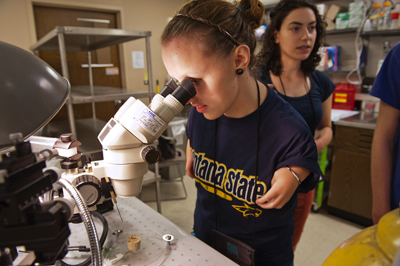
Diversity in STEM
Science, technology, engineering, and mathematics (STEM) play important roles in solving problems from the environment to health care. STEM includes fields such as agricultural sciences, forestry, astronomy, ecology, psychology, computer sciences, and social sciences. To ensure high quality research and practice, it is important to recruit talented individuals from diverse backgrounds into these fields. A range of abilities and disabilities contributes to this diversity.
Some disabilities affect vision, speech, hearing, or mobility. However, most disabilities are not obvious. Invisible disabilities include, but are not limited to, learning disabilities, attention deficits, autism spectrum disorders, and psychiatric conditions.
Projects for Students with Disabilities
The Research in Disabilities Education (RDE) program of the National Science Foundation (NSF) has funded research, practices, and dissemination efforts that broaden the participation and achievement of people with disabilities in STEM education and careers. These activities have engaged high schools, two- and four-year postsecondary institutions, graduate programs, employers, and other organizations nationwide. Projects have employed evidence-based and promising practices to increase degree completion and workforce participation in STEM fields. Interventions have included internships, research experiences, other work-based learning experiences, mentoring, peer support, and workshops. Funded projects have also delivered professional development for educators, policy-makers, and employers.
Project results have contributed to knowledge regarding STEM learning for students with disabilities and how educational, social, work, and research experiences influence
- interest in STEM;
- academic performance;
- retention in STEM degree programs;
- STEM associate, baccalaureate, and graduate degree completion; and
- career choices.
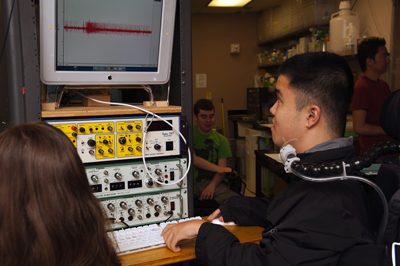
Funded activities have taken place in most states and served thousands of primary, secondary, community college, and university students with disabilities as well as educators, employers, and other members of stakeholder groups. You can learn more about these projects at www.washington.edu/doit/programs/RDE.
Although RDE no longer exists as a separate program within NSF, funding seekers are encouraged to search current programs at NSF for opportunities where they can propose research, dissemination, and broadening participation projects related to the engagement of people with disabilities in STEM. See www.nsf.gov/ for details.
Engagement Between Projects
Project leaders who have contributed to the collaborative dissemination website have engaged in teleconference, email, and in-person communications to learn from one another and share experiences and resources. They have collaborated in public forums such as the National Science Teachers Association, the Association for Higher Education and Disability, and other conferences and workshops. They have also co-authored publications. Individuals who wish to engage with others interested in increasing the success of individuals with disabilities in STEM fields can join the online Broadening Participation Community of Practice by sending a request to doit@uw.edu.
Examples of Project Activities
The following table provides examples of evidence-based practices employed by many projects that serve to increase the participation of individuals with disabilities in STEM. Individuals who wish to lead future activities can gain insights from these ideas.
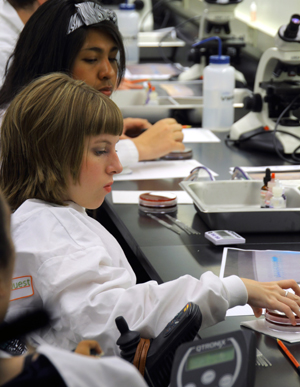
| Services | Examples |
|
Activities for precollege, college, and graduate students with disabilities |
|
| Online and on-site professional development |
|
| Communities of practice |
|
| Journal publications and other resources |
|
Long-Term Impact
RDE projects have hosted activities that affect student advancement through critical junctures toward a STEM career:
- from high school to college,
- between two- and four-year colleges,
- from undergraduate STEM degree programs to the workplace,
- from undergraduate to graduate STEM degree programs, and
- from graduate school to industry or academia.
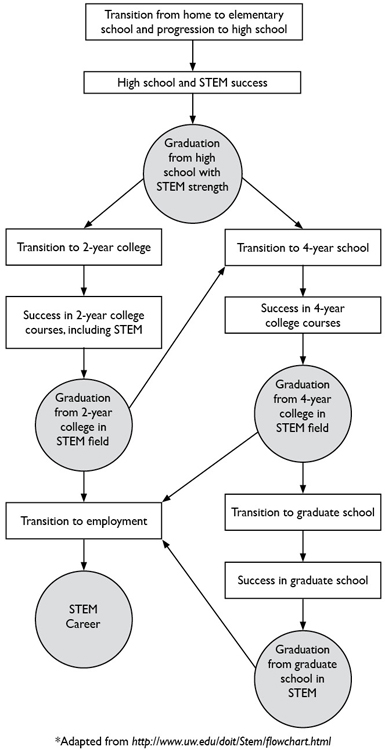
The flowchart and reference to the left provide details regarding these critical junctures. The progress of participants from some funded projects is documented in the ongoing Longitudinal Transition Study report. Findings suggest that project activities increase interest and success in STEM fields for students with disabilities.
Ultimately, such activities will increase the participation of people with disabilities in STEM fields and enhance these fields with their expertise and perspectives.
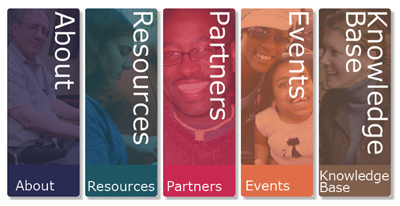
The Collaborative Dissemination Website
www.washington.edu/doit/programs/RDE
Past and current STEM projects that focus on individuals with disabilities act as a catalyst and resource for individual institutions and employers in their efforts to recruit and retain individuals with disabilities in STEM. Their replication models, curriculum materials, checklists, videos, and other products are available in a collaborative dissemination website and shared in a searchable Knowledge Base. Materials on the website serve to increase awareness of how people with disabilities can be successful in STEM as well as how other programs can make their web and print resources, courses, worksites, and activities more welcoming and accessible to people with disabilities.
The website is organized into five major content areas, which are described below. Individuals can contribute to this collection of resources by sending suggestions to doit@uw.edu.
About
Find general information about the collaborative dissemination project origin and goals. The DO-IT Center at the University of Washington created the website with funds from the RDE program of the NSF (Grant #HRD-0929006). DO-IT continues to maintain the site and add new content from other programs and organizations that is relevant to promoting the success of individuals with disabilities in STEM fields.
Resources
Explore links to publications, videos, and websites about the engagement of people with disabilities in STEM. Also find a list of journal articles that address issues related to broadening the participation of individuals with disabilities in STEM; many of these articles were supported with NSF funds. Materials in this section of the website are useful for individual or group training. To contribute a resource, send your ideas to doit@uw.edu.
Partners
Access a list of the partners in the collaborative dissemination project.
Events
Find a list of upcoming local, regional, and national events. To suggest an event not currently included in the calendar, email doit@uw.edu.
Knowledge Base
Explore this searchable Knowledge Base of questions and answers, case studies, and promising practices. Find answers to programmatic and technical questions at basic and advanced levels; learn about the experiences of individuals and programs; and locate links to publications, websites, and videos that support the advancement of people with disabilities in STEM. To contribute to this resource, send suggestions to doit@uw.edu.
Acknowledgment
The Research in Disabilities Education Collaborative Dissemination is directed by the DO-IT (Disabilities, Opportunities, Internetworking, and Technology) Center, and funded by the National Science Foundation's Research in Disabilities Education program (Grant #HRD-0929006). Any opinions, findings, conclusions, or recommendations expressed in this publication are those of the authors and do not necessarily reflect the views of the National Science Foundation.
Copyright © 2013 University of Washington. Permission is granted to copy these materials for noncommercial purposes provided the source is acknowledged.